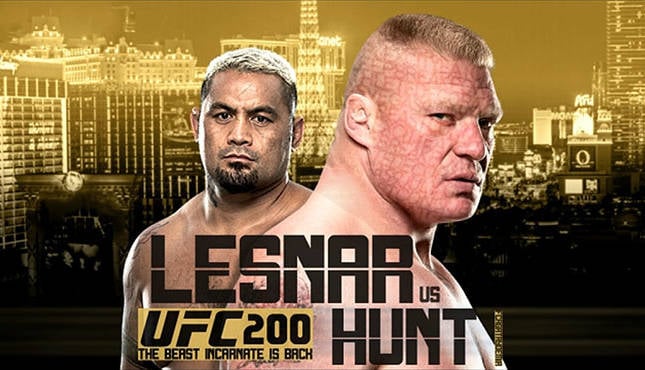mma / News
UFC Responds To Mark Hunt’s Claims Against Them & Brock Lesnar, Files Motion To Dismiss
 Image Credit: UFC
Image Credit: UFC
PWInsider reports that UFC has filed a motion to dismiss the lawsuit Mark Hunt filed against them, Dana White, and Brock Lesnar on 2/28, claiming the allegations against them are false. The lawsuit by Hunt was filed back in January.
Hunt’s lawsuit claims that, “Without Mark Hunt’s knowledge or consent, the UFC conspired and caused Brock Lesnar, a doping fighter, to fight Hunt, a clean fighter, despite the fact that Lesnar used substances banned by the UFC, USADA and WADA. The substances, Clomiphene and 4-Hydroxyclomiphene, are known “Post Cycle Therapy” (“PCT”) substances believed to be used after a period of strength training with anabolic steroids or similar prohibited substances.”
Hunt alleges that as a result of his UFC 200 loss against Lesnar, he “suffered severe physical injury, as well as economic and non-economic damages including without limit damage to his reputation, title contention, and future earning capacity” and that both Lesnar and UFC were “unfairly enriched” due to Lesnar being able to fight despite doping. Hunt’s lawsuit goes on to claim that Lesnar made over $2.5 million for the fight and that he and UFC made a lot of money at the expense of fighter safety and fair competition.
Hunt also claims that UFC’s conduct leading to UFC 200 was “representative of and consistent with a pattern of conduct by Defendants of wrongfully jeopardizing fighter health and safety for profit, in violation of state and federal law and the UFC’s own policies. The UFC’s pattern of conduct includes, but is not limited to, granting doping exemptions and drug testing exemptions to known doping-competitors, and causing those drug-enhanced fighters to compete with clean fighters.”
In their motion to dismiss, filed on 2/28, UFC’s attorneys noted the following: “Ignoring the inconvenient fact that the strict anti-doping drug-testing procedures implemented by Zuffa and administered by the independent United States Anti-Doping Agency are the vehicle by which cheating fighters have been exposed and punished, Hunt nonetheless seeks to employ the heavy hand of the federal RICO statutes to stigmatize Defendants and other individuals with baseless allegations of quasi-criminal conduct in the hopes of reaping a windfall in the form of treble damages.”
In other words, their position is that it doesn’t make sense for them to be involved in a conspiracy to have fighters using banned substances fighting when they are actively catching fighters who are using performance enhancing drugs.
UFC also noted that Hunt’s request to be given Lesnar’s payoff and a percentage of the UFC 200 earnings due to Lesnar’s PED violation is baseless because Hunt’s contract for the fight stated that he would receive $700,000 whether he won or lost. UFC argues that Hunt “cannot now employ the quasi-contractual principle of unjust enrichment to retroactively graft additional payment obligations on to the parties’ agreement.”
UFC also responded to Hunt’s claim that Lesnar was allowed to fight at UFC 200 without subjecting to the drug testing required for fighters coming out of retirement. UFC served up proof that Lesnar was tested eight times in the month before his fight with Hunt, noting that UFC and Zuffa were only made aware of Lesnar’s test failures after the fight occurred, and that they suspended Lesnar for 12 months once they learned of the failures. In addition to that, the Nevada State Athletic Commission fined Lesnar $250,000 and changed the official result of the fight to a no contest.
UFC also said that Hunt’s case relies heavily on a theory that he would have beaten Lesnar had Lesnar not been doping, and that he would have then received title shots and marketing opportunities, calling that theory “speculative” and not based on any actual evidence.
In response to Hunt’s allegation that UFC was giving him doped-up fighters to fight, UFC noted that nothing in Hunt’s contract obliged them to provide him with “clean opponents,” even though the company does everything in their power to maintain clean fighters and clean fights. They go on to say that UFC/Zuffa cannot ever agree to a contractual obligation to deliver clean fighters because it is impossible for them to totally control what fighters put into their body. They add that the things they can do, such as banning substances and imposing penalties if those substances are used, are already being done.
UFC also responded to Hunt’s claim that there is an ongoing criminal enterprise working to make money off of doped-up fighters fighting in UFC. UFC said that Hunt’s can’t claim such a thing without any hard evidence or without breaking down exactly what he is talking about.
Hunt also had made claims that UFC committed wire fraud based on an incident where a Zuffa employee apparently emailed out drug test results for Viktor Belfort to 29 others and the company then used legal threats to keep the information under wraps and prevent those people from disclosing the results. UFC claims that since Hunt was not one of the people who got those emails and thus did not get any legal threats, he can’t claim wire fraud since he was not involved in the situation.
UFC’s motion to dismiss also claims that “Hunt appears to have named Defendant [Dana] White as an individual defendant in a gratuitous effort to stigmatize him with baseless allegations of quasi-criminal conduct” and that the filing failed to give White proper notice to defend himself and that Hunt’s claims against White are allegedly simply factual statements about him and do not show any alleged wrong-doing.
The next step in this is a hearing on the motion to dismiss, which will take place on 5/15.







